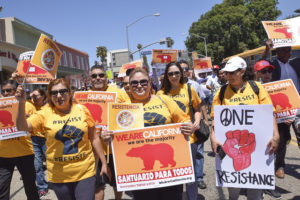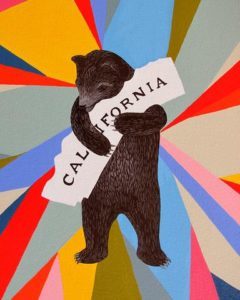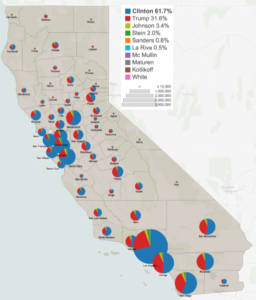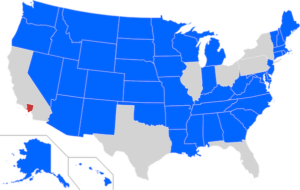Part 1: California and The Resistance
In November 2016, Californians voted two-to-one against Donald Trump and his anti-immigrant, “America first” campaign.
Ever since that election, California has been seen as the heart and center of the “Resistance,” a term that quickly emerged as a popular rallying cry after Donald Trump’s controversial Electoral College after running an anti-immigrant and very populist campaign.

While this attention has largely been seen in a domestic context, i.e. California’s role in the American politics and culture, the Golden State actually has at least as much potential to combat similar anti-immigrant and authoritarian advances internationally.
Fulfilling this potential at home or abroad, however, involves employing an aspect of California’s place in the world that is only now becoming apparent to Californians themselves, namely California’s extraordinary degree of independence from the recent wave of populist authoritarianism that has not only reshaped America’s Republican party and federal government, but has undermined democratic institutions in Europe and other parts of the world.
More than any other global actor, California can lead the world beyond resistance to a robust revival of belief in democratic government and a respect for diversity, but only if they themselves can go past what up to now has been deemed impossible and fully embrace this uniquely Californian form of independence in thought and action.

It is no mystery why California nearly immediately became a symbol of resistance to Trumpian politics. As everybody knows, the Golden State possesses a very diverse population that leans very blue. Non-Hispanic whites are no longer the majority and Californians haven’t voted a single Republican to any state office in over a decade, ever since the celebrity governorship of action film star and unconventional Republican Arnold Schwarzenegger in the mid-2000s. Since 2012, Republican power has sunk so low that California’s Democratic Party has enjoyed a supermajority in the State’s Legislature.

Another reason why California ignites progressive hearts in America and elsewhere is equally obvious: California is a global economic and cultural powerhouse. Following behind only the United States, China, Japan and Germany, California has superseded the United Kingdom to become the world’s fifth largest economy, despite the UK having 50% more people. The state gave birth to the digital age and is home to Silicon Valley which is still high tech’s leader after over 30 years at the post. Hollywood is still ground zero worldwide for movies, television, and streaming media. And California has been a global agricultural powerhouse for over a century.
Given these impressive credentials, there was a great deal of anticipation as the world wondered what the Golden State would do in response to the election of Donald Trump and the Republican sweep of all three government branches in the U.S.’s most controversial election in history. Among themselves and on social media, it has been a question that 40 million Californians have been asking as well.
One early development that grabbed a great deal of attention was the suddenly high profile notion of California independence in the form of outright secession. Long on the fringe and ignored by mainstream media and the public, the sentiment materialized in the form of two initiatives and the catchy term #CalExit, inspired by the #Brexit movement in the United Kingdom to exit the European Union. Although nearly universally seen as legally impossible, and possibly dangerous, the notion found resonance in online chat rooms, and multiple polls found a third of Californians in support of the idea.
In terms of The Resistance, however, the idea of Californian independence has generally been a non-starter. One of the most influential Resistance group is named “Indivisible” which is as revealing in tone and worldview as the term “the Resistance”.

The Resistance movement so far has focused on the local level and has succeeded in bringing a large number of new people into politics, especially women. Most strikingly the Resistance Movement has found success on the Federal level with the 2018 Midterm elections. In this national context, California played a key role by flipping seven Republican seats in the House of Representative seats, elevating San Francisco Congresswoman Nancy Pelosi to the speakership. (In a historical first, the House Minority Leader, Kevin McCarthy, is also a Californian.)
As successful as these national strategies have been, a Washington-centered approach may not be the best utilization of California’s enormous resources going forward, especially in a global sense. For one thing, the Presidential election of 2016 demonstrated perfectly the lack of power Californian voters possess on the Federal level. As mentioned earlier, Californians voted two-to-one against populism and authoritarianism but it wasn’t enough to overcome the enormous structural barriers they faced in the Electoral College. Every single Californian voter could have against Trump and the outcome would have been identical.
Unfortunately, California’s democratic deficit goes way beyond the Electoral College. The Senate’s very organization gives small states far more say in Supreme Court and Cabinet selections. Forty-three states with populations smaller than the county of Los Angeles have two Senators a piece while L.A. County residents share their two Senators with 30 million other Californians. It is an easy task for the small states in southern and midwest regions of the U.S. to dominate the Senate, either by being the majority or, failing that, by use of the filibuster.

Ironically, given the cold reception of Californian independence by Resistance Movement leaders, it may be that a different sort of California independence—a relative and operational independence stemming from the Golden State’s freedom from Republican tactics and influence—that may be the real strength that Californians bring to the Resistance.
Even though California possesses a deeply entrenched democratic deficit in the Federal system, its Democratic supermajority at home means that California is by far the biggest and strongest “major power” to possess the operational independence from authoritarian populists. This puts the state in a potentially very powerful position in terms of stopping the forces who are actively seeking to disrupt democracy and divide communities, not only in the United States but around the world.
—T. Vollmer
followed by:
